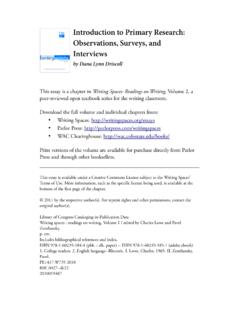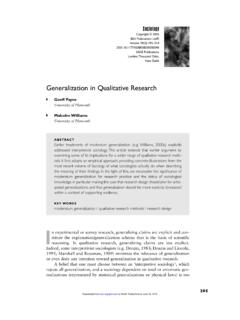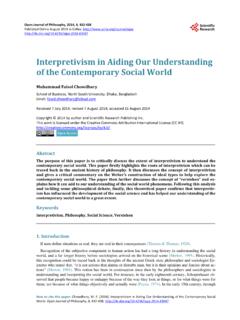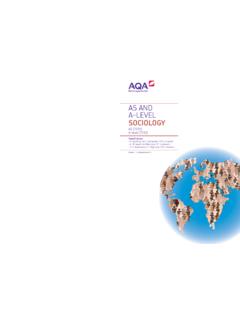Transcription of The Functionalist Key concepts, sociologists, Test ...
1 The Functionalist perspective on education Reading/ Resources Key concepts, sociologists , research studies and examples Test yourself practice assessment questions There are four key functions of education: Creating social solidarity Teaching skills necessary for work Teaching core values Role Allocation (and meritocracy) Students need to be able to explain how education performs these functions, with examples and evaluations. Core knowledge and evaluations The Functionalist perspective on education Evaluating the Functionalist perspective on the role of education Extension/ In the News Emile Durkheim's view on the role of education in society Talcott Parson's perspective on education Concepts (definitions) Organic analogy Value consensus Role allocation Particularistic/ Universalistic values Specialist skills Social solidarity Meritocracy National identity sociologists Durkheim, Parsons, Davis and Moore Studies/ evidence/ examples The fact that schools 'work' for most pupils (educating Yorkshire etc).
2 The increase in Vocational Education The fact that people with degrees earn 85% more than those without degrees Truancy and exclusion statistics. Basic recap questions and pop quizzes Functionalism or Marxism? quizlet flashcards What s the difference between functionalism and Marxism? Exam style questions Outline three functions which education might perform for society (6 marks) Evaluate the Functionalist view of the role of education in society (30 marks, long version) Evaluate the Functionalist view of the role of education in society (30 marks, short essay-plan version) Applying material from Item B and your knowledge, evaluate sociological explanations of the role of education in transmitting ideas and values.
3 (30 marks long version from the 2017 paper 1 exam). The Marxist perspective on education Reading/ Resources Key concepts, sociologists , research studies and examples Test yourself practice assessment questions Traditional Marxism Education works in the interests of the elite and the middle class: School forms part of the ideological state apparatus It reproduces class inequality It legitimates class inequality. Education works in the interests of capitalist employers Neo-Marxism (Paul Willis) Students are active not passive, but membership of the counter school culture still leads to inequality Students need to be able to explain how education performs these functions, with examples and evaluations.
4 Core knowledge and evaluations The Marxist perspective on education (includes Paul Willis) Bowles and Gintis The Correspondence Principle Bowles and Gintis The Illusion of the Equality of Opportunity Evaluating the Marxist perspective on education Paul Willis: Learning to Labour Extension/ In the News Why intelligence doesn t explain success Concepts (definitions) Ideological state apparatus Repressive state apparatus Ideological tool Dominant ideology Correspondence theory The hidden/informal curriculum sociologists -Bowles and Gintis (1976) Schooling in Capitalist America -Paul Willis (1977) Learning to Labour Studies/ evidence/ examples Contemporary evidence you need to be able to apply The fact that schools 'work' for mos pupils (educating Yorkshire etc).
5 The increase in Vocational Education The fact that people with degrees earn 85% more than those without degrees Truancy and exclusion statistics All of the evidence on the relationship between social class and educational achievement. Basic recap questions and pop quizzes Functionalism or Marxism? quizlet flashcards What s the difference between functionalism and Marxism? Exam style questions Assess the Marxist view of the role of education in society (30 marks, full essay). The Neoliberal/ New Right perspectives on education Reading/ Resources Key concepts, sociologists , research studies and examples Test yourself practice assessment questions Neoliberalism key ideas - The state should not provide public services - The state should encourage competition through deregulation, low taxation and privatization The New Right A conservative viewpoint which Incorporates many neoliberal ideas.
6 Believe in the marketization of education (parental choice and schools competing for pupils) The 1988 Education Reform act was introduced to create a market in education Voucher systems have also been proposed Core knowledge and evaluations Neoliberalism and the New Right: An Introduction Neoliberal and New Right views on education Evaluating the New Right View of Education Extension/ In the News/ links Also see the 1988 Education Reform Act Concepts (definitions) Privatisation Marketisation Parentocracy Voucher Systems sociologists Chubb and Moe (voucher systems) Studies/ evidence/ examples See those relevant to the 1988 Education reform act, under policies.
7 Basic recap questions and pop quizzes Functionalist , Marxist and New Right perspectives on education recap/ test yourself video Sociological perspectives on education summary grid (includes late and postmodernism) Exam style questions Applying material from Item A, analyse two effects of increased parental choice on pupils experience of education. (10 marks, full question with item and answer). Sociological Perspectives Applied to Work Reading/ Resources Key concepts, sociologists , research studies and examples Test yourself practice assessment questions All of the three main perspectives explicitly comment on how education relates to work, and all of the main education policies had vocational elements within them, so this is really just a review topic that fuses these two together Perspectives to apply.
8 Functionalism Marxism The New Right Feminism (focusing on subject choice) Education polices to draw on Vocational education Apprenticeships Core knowledge and evaluations Sociological perspectives on the relationship between education and work Sociological perspectives on vocational education Extension/ In the News Does Britain have a class ceiling? (80% of the UK population still thinks class is a barrier to social mobility). Also see Posts from Policies, social class, gender and subject choice. Concepts (definitions) Role allocation Meritocracy Correspondence principle The reproduction of class inequality The counter school culture Vocationalism Policies - New Vocationalism - Modern Apprenticeships Studies/ evidence/ examples Basic recap questions and pop quizzes N/A.
9 Exam style questions Evaluate-Sociological Perspectives on Vocational Education (30) The significance of education policies (part 1) Reading/ Resources Key concepts, sociologists , research studies and examples Test yourself practice assessment questions The 1988 Education Reform Act - Principles: Marketisation/ parentocracy - Specifics: League tables/ formula funding/ OFSTED/ national curriculum New Labour s Education Policy Reforms 1997 2010 Carried on with marketisation (more targets and specialist schools Academies Education Maintenance Allowance Sure Start Coalition and Conservative education reforms since 2010 Funding cuts Forced academisation Free schools Pupil Premium There are two major questions the exam board has traditionally asked: To what extent have these policies raised standards in education To what extent have these policies improved equality of opportunity?)
10 Core knowledge and evaluations The 1988 Education reform act New Labour s Education Policies (1997-2010) 2010 2015 The Coalition Government s education policies Extension/ In the News The 1944 Tripartite system and comprehensive schooling (the syllabus doesn t say students need to know this, but some historical context might be useful and interesting!) Are league tables good for education? Free Schools arguments for and against Concepts (definitions) Parentocracy The New Right League Tables The National Curriculum Selection by mortgage Teaching to the test Polarisation Sink schools The school-parent alliance Disconnected choosers and skilled choosers Cultural and social capital Academies Free Schools Sure Start Education Maintenance Allowance Vocationalism Modern Apprenticeships Compensatory education Free schools Basic recap questions and pop quizzes Education policies in the UK a very brief overview Exam style questions Analyse two ways in which marketization policies may have increased inequality of educational opportunities for some students (10)




